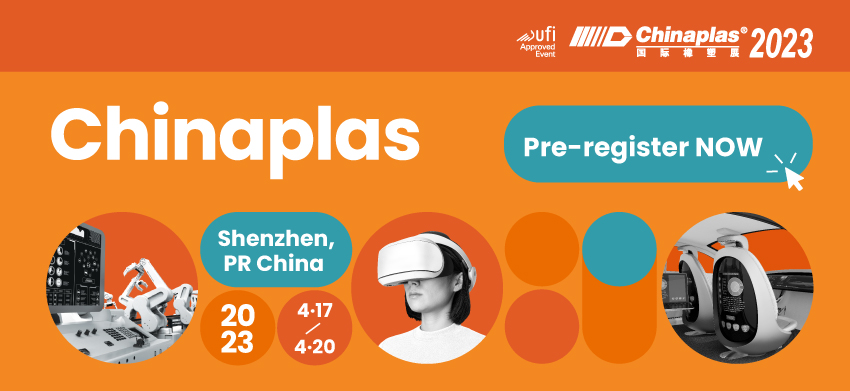CHINAPLAS 2023 Features 3,900 Global Exhibitors, and an Opportunity to Reach Indonesia’s Growing Plastics Industry
At CHINAPLAS 2023, Asia’s primary plastics and rubber trade fair, more than 3,900 exhibitors will present their latest innovations to support the requirements for innovative technologies of Southeast Asia’s fast-growing plastics industry. Historically, the exhibition has been well-attended by visitors from Indonesia who are always eager to see the on-site demonstrations and connect with exhibitors to learn more about innovative products and services that they can apply in their own business operations. For more information, please visit: www.chinaplasonline.com.
Indonesia’s rising personal consumption, a robust export sector, successful coronavirus response and sustained investors’ confidence are placing Indonesia in a position for strong economic growth in 2023 and beyond. The country is projected to post 5.3% year-on-year growth in 2023 from 5.2% in 2022, based on government-released statistics.
This solid growth is reflected in the country’s various industries, among them the plastics industry. Indonesia’s plastics market is projected to register a CAGR of more than 6% in the period 2022-2027, according to a report by Mordor Intelligence. The report also points out that sustained high demand from end-user industries is expected to drive market growth during the period. Of the industries dependent on plastics, the packaging sector has emerged as the biggest application for plastics with estimated 159.2 million units of production by 2024, based on GlobalData projection.
Indonesia is a major importer of raw materials and machineries in Southeast Asia
Indonesia remains a major importer of raw materials and machineries in Southeast Asia, as it beefs up its plastics industry with highly advanced production systems. The country’s plastics import could reach US$11.22 billion by 2026 from US$9.49 billion in 2021, growing 2.6% year on year on average, according to ReportLinker.
In terms of machinery requirements, injection molding technology dominates, along with increasing demand for extrusion machinery. In particular, the robust performance of the domestic packaging, automotive, medical and chemical processing industries provides a stable market for injection molding systems. Machineries capable of processing recycled plastic materials are taking a front seat as Indonesian plastics manufacturers adhere to the preference for environmentally-friendly products in response to the circular economy targets.
Also, under the Making Indonesia 4.0, highly advanced technologies such has artificial intelligence (AI), Internet of Things (IoT), automation and robotics are being encouraged and fast gaining acceptance in the plastics industry, thereby creating opportunities for businesses providing such technologies, products and services. The strategy has identified five manufacturing sectors to spearhead industrial growth – food & beverage, automotive, electronics, chemical (including plastics), and textile.
Under the Making Indonesia 4.0, highly advanced technologies are being encouraged and fast gaining acceptance in the plastics industry.
Dynamic packaging sectors as frontrunner in plastics application
Having the largest population in Southeast Asia with 270 million people, Indonesia is the world’s fourth largest consumer market in terms of population size – behind India, China and the United States. It comes to no surprise that personal consumption has been on the rise and demand for food and beverage packaging continues to swell. Food and beverage, healthcare, and consumer goods sectors are primary end-users of rigid plastic packaging, while food and beverage, health/beauty care and medical products are the main users of flexible packaging.
The Indonesian flexible packaging market is projected to reach US$5 billion by 2027, registering a CAGR of 4.74% from 2022-2027, based on Mordor Intelligence estimates. The flexible packaging sector plays a key role in Indonesia’s move to achieve a circular economy by encouraging the shift towards single-layer plastic films to multilayer, high-barrier, recyclable packaging material. The industry is driven by the country’s large consumer base that demands low-cost flexible packaging products that are lightweight, convenient and aesthetically appealing. Smart manufacturing in packaging production has also enabled the production of reusable pouches, bag-in-box, liners, shrink wraps and other new options.








